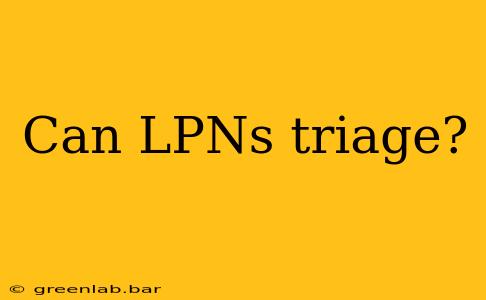The question of whether Licensed Practical Nurses (LPNs) can triage is complex and doesn't have a simple yes or no answer. The truth is, it depends heavily on several factors, including state regulations, employer policies, and the specific setting where the LPN works. While the core responsibilities of an LPN don't explicitly include independent triage, the reality is often more nuanced.
What is Triage?
Before delving into the LPN's role, let's define triage. In healthcare, triage is the process of assessing patients to determine their priority for treatment based on the urgency and severity of their condition. This involves gathering information about symptoms, medical history, and vital signs to quickly identify those needing immediate attention from those who can wait. It requires clinical judgment and the ability to recognize life-threatening situations.
The LPN's Role and Triage Responsibilities
LPNs, also known as Licensed Vocational Nurses (LVNs) in some states, provide basic nursing care under the supervision of a physician, registered nurse (RN), or other licensed healthcare professional. Their duties often include:
- Taking vital signs: This is a crucial component of triage, providing baseline data for assessment.
- Assisting with patient assessments: LPNs can assist RNs in gathering patient information, but usually not independently performing a full triage assessment.
- Documenting patient information: Accurate documentation of patient findings is essential for any triage process.
- Administering medications: In some cases, this may be part of the treatment plan determined through the triage process.
- Providing basic wound care: Depending on the patient's condition and the triage decision, wound care could be part of the immediate treatment.
Crucially, independent triage, the complete process of assessing and prioritizing patients without RN oversight, is generally NOT within the scope of practice for LPNs in most jurisdictions. State licensing boards define the legal parameters of nursing practice, and these often restrict LPNs from making independent decisions regarding patient prioritization in an emergency setting.
Situations Where LPNs May Assist with Triage
While independent triage is usually off-limits, LPNs can play a supportive role under the direction of an RN or physician. This might include:
- Collecting initial patient information: Taking a patient's history and vital signs, which are then relayed to the RN or physician for triage decision-making.
- Preparing patients for examination: Getting the patient ready for the RN or physician who will perform the triage assessment.
- Assisting with treatment based on triage decisions: Providing care based on the priorities set by the RN or physician.
Understanding the Importance of Scope of Practice
It’s essential for LPNs to understand and adhere to their scope of practice to ensure patient safety and avoid legal ramifications. Exceeding one's scope of practice can lead to disciplinary action from the state board of nursing, malpractice lawsuits, and potentially harm to patients. Always check your state's regulations and your employer's policies for specific guidelines on your role in triage processes.
Conclusion
While LPNs can contribute valuable support during triage situations, independent triage is generally beyond their scope of practice. Their role is often one of assisting and supporting RNs and physicians in efficiently and effectively managing patient flow and providing appropriate care based on the triage decisions of appropriately licensed personnel. Always prioritize patient safety and operate strictly within the boundaries of your licensing and employer policies.

